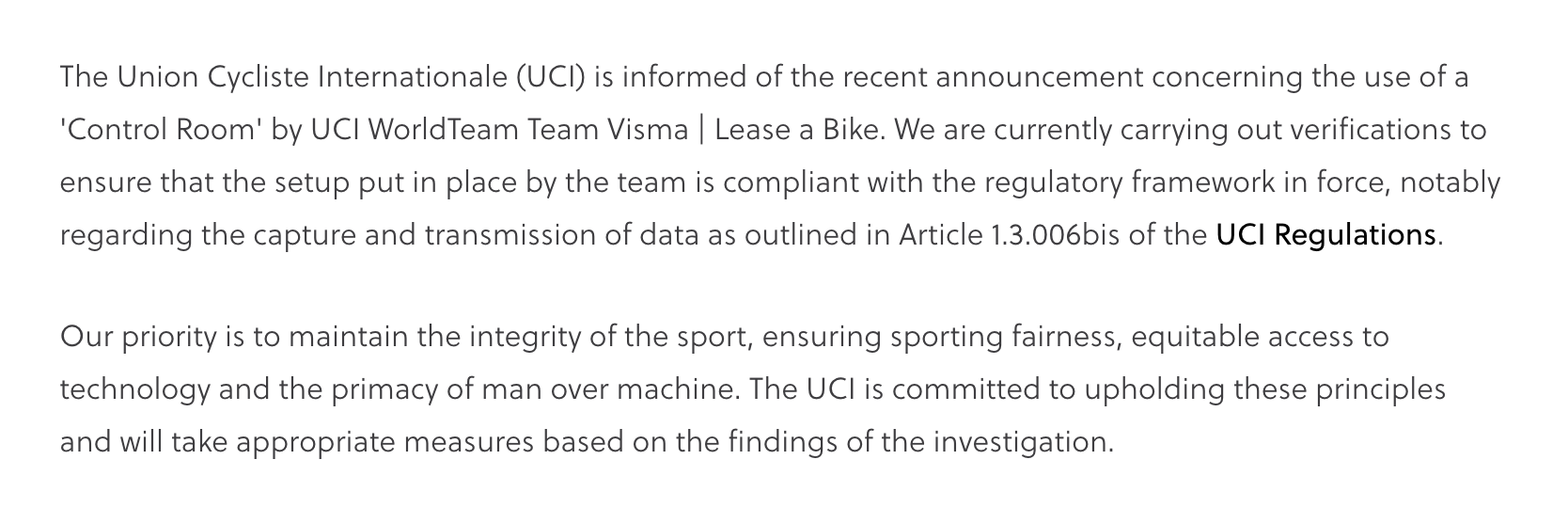Florence, IT — The UCI has announced an investigation into the recently unveiled data van put into action by Visma-Lease a Bike at the 2024 Tour de France.
The van, dubbed “Control Room” and announced by the team in a short video touting the team’s “limitless thinking” on Thursday, is essentially cycling’s version of a Formula 1 pit wall, minus a lot of data and a couple of decades of refinement.
The idea is simple: Take key raceday decision-making away from the chaos of a team car and move it to a location where there are no flats, no fans, no corners or hard braking, no distractions to the task at hand. By providing a central hub for data capture and analysis capability – better real-time understanding of weather, a TV feed that doesn’t randomly stop working (as it often does in team cars), analysis of power figures and thus daily fatigue – Visma hopes it can make better calls in important moments.
The UCI takes such things quite seriously. Most notably, the governing body has strict rules around data acquisition and use. Article 1.3.006BIS allows mechanical data, like power figures and tire pressure, to be broadcast to a team car or similar, while requiring that other information, like heart rate, sweat rate, and core body temperature, can only be viewed by the rider. They cannot be broadcast to a team car or to Visma’s new Control Van.
This is what the UCI is checking for inside the Visma van. Why allow some data to be broadcast but not all? That comes back to one of the core principles of the UCI’s regulations, which were built on a document called the Lugano Charter in the late ’90s. That principle is one of man over machine and, by extension, the desire for a sort of broad technological fairness within the sport. The UCI specifically mentions this principle in its release on Thursday:

Why did Visma bother?
Photos of the Control Room van show quite a lot of basic but useful information. There are maps, weather screens, a feed from the team car, a feed from Twitter/X (always home to the best tactical information), ProCyclingStats, Whatsapp, and more. Making major decisions from the passenger seat of a largely info-blind team car is a vestige of an older era and, frankly, probably does deserve a rethink.
The only real-time rider data that the Control Room can access is mechanical data, data that comes from the bicycle itself. That includes power, cadence, tire pressure, gearing and the like. They can’t use real-time info from the rider’s body, including heart rate, sweat rate, or body temperature sensors. They can, however, include such data in post-race analysis and track it throughout a three-week stage race.
More likely, according to Jacob Tipper, a professional coach for a number of WorldTour riders, including EF Education-EasyPost’s Ben Healy, the benefits won’t come this year.
“It’s going to be relatively exploratory for now; data is only useful if it’s actionable, but the first step is to collect that data and then you can work out how that aligns with performance, and then you can start to make decisions to positively affect the outcome of the race,” Tipper told Escape Collective.
“So while I don’t expect too much influence in this first Tour, it will be interesting how it progresses throughout the oncoming years because the benefit will really be maximised in the future rather than just this first Tour.”
Then there’s the usefulness of a few mental games. One-upmanship is rife in cycling, as is a desire to keep up with the proverbial Joneses. A bigger bus, a nicer car fleet, a new bike or wheels or type of cooling vest; the teams and riders do pay attention, and appearing to be better resourced or altogether cleverer has its own benefit.
Of course, if that benefit is seen to be too great, flipping primacy from man to machine, the UCI has shown an endless willingness to step right in.
What did you think of this story?


